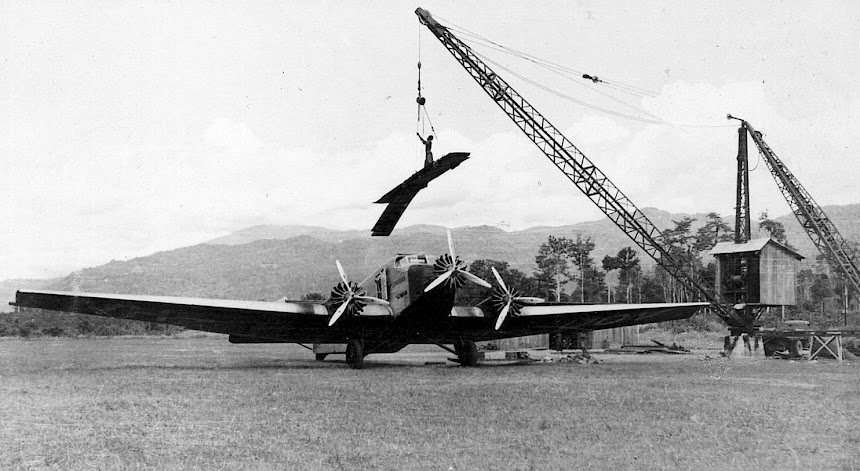The remote Tekadu people have used the Bulldog Track for many years to bring their market goods like
buai (betelnut), tobacco, dried river fish, galip nuts and gold for sale into Kaindi (Eddie Creek) and Wau, and also to access to health centres and to bring children for school. The closure of Tekadu people’s only access into Kaindi and Wau town has left them with no option but to trek from Tekadu and overnight in Nukeva (Tauri Lakekamu local level government (LLG) - Kerema) then catch banana boat for Yopoi Bridge (Malalau –Kerema) and then catch a PMV to Port Moresby – a total of three or four days of travel.
Councillor of Tekadu Ward 20 of Wau Rural LLG, Henry Timothy, explains that for the villagers to transport a 20kg bag of buai into Port Moresby, they have to pay village porters to carry
buai bags from Tekadu into Nukeva (a whole days walk) and then another day on banana boat into Yopoi, and then catch PMV on the notorious Kerema Highway into Port Moresby
Many have fallen victims of criminal hold ups on PMVs and banana boats, while the economics of transporting their produce from Tekadu into Port Moresby has proven uneconomical ever since the closure of their only access into Wau by MMJV mine operators Newcrest of Australia and Harmony Gold of South Africa.
Councillor Henry stressed that the cost of travelling to Port Moresby markets had made it very difficult for the locals to earn a living, and many had given up their ways of earning cash by returning to a subsistent way of life, which meant they would not be able to afford salt, cooking oil, school fees, rice, soap and even cloth themselves.
Trekking into Hidden Valley and Eddie Creek has been their traditional route and the councillor wants their local MP Sam Basil to fight the developer of Hidden Valley for their rights to use the Bulldog Track again.
Mr Basil assured Councillor Henry that the traditional rights of the people to have access to the Bulldog Track that runs into Hidden Valley Mine would be challenged in court.
 |
| Bulolo MP Sam Basil and Councillor Henry Timothy |
Before the mining company arrived, the Tekadu people have been using the Bulldog Track, even long before World War 11, and know that they still have their rights.
They believe that there are international laws somewhere, including our national constitution that can protect the indigenous people’s rights like themselves and their way of living from big international mining companies like MMJV.
In 2006 and again in 2009, the Tekadu people tried to protest at the entrance of the company in Hidden Valley to ask for their access rights, but were ignored.
The first attempt resulted in several arrests made.
Councillor Henry said the victims were Peter Yaku and Sonagi Elimas, including their wives, who were arrested and detained in Bulolo cells and were later released on bail.
When MMJV commenced the Hidden Valley mining operations, it prohibited access by the Tekadu people to the Bulldog Track by placing locked gates and security guards with guns at the points where the track enters and exits the mining lease area.
MMJV have unlawfully terminated the access to the Bull Dog track for these people.
The Bull Dog track was constructed by Australian Army engineers and Papua New Guineans over nine months in 1943.
 |
| Satellite image of the Bulldog Track |
More than 2, 000 Australians and 2, 000 Papua New Guineas cut the road with pickaxes and dynamite over a period of eight months and it was built for the purpose of providing a supply line for future military operations in the Markham Valley and on the North Coast of Papua New Guinea.
The Chief Engineer, W. J. Reinhold, was later to write "Every foot of progress made on this road exacted the ultimate in courage, endurance, skill and toil. Its construction took a toll from surveyor, engineer, laborer and native carrier alike."
Mr Basil said the people now have to walk around, in much more-difficult terrain that added three days onto their journeys.
The people of Yanina, Anandea, Yanawe, Tekadu 1 and Tekadu 2 cannot bring store goods back to their homes because of the rough terrain and have to cross into Gulf and Central provinces to sell their betelnut and raise funds for their basic needs and to get treatment at health centres.
The lengthy walk means the people cannot carry their market goods into Wau nor get emergency case to medical treatment into Wau in time.
There was an aid post and a school in the Tekadu area but both closed due to the blocking of the track by MMJV.
Last year a woman who had complications from child birth was carried for seven days on the diverted route and she died 50m from the health centre.
Had she and her carriers been allowed access to the Bulldog track, she would have reached the health centre days earlier, and probably would have survived.
The closure of Bulldog Track has also affected the tourism industry, because unlike the Black Cat Track villagers, people from Tekadu cannot build guest houses or participate in the tourism business spin-offs.
By blocking access to this track, MMJV has infringed on the people’s customary land use rights contrary to the Mining Act and breached their Constitutional rights including but not limited to S52 Freedom of Movement and S53 Unjust Deprivation of Property. MMJV has neither provided an alternate route for the Tekadu people, nor compensated them for their loss of land use and breach of their rights.
The Bulolo District has determined that it will assist these people to take redress against MMJV and enforce these people’s rights and hold MMJV accountable for their actions.


